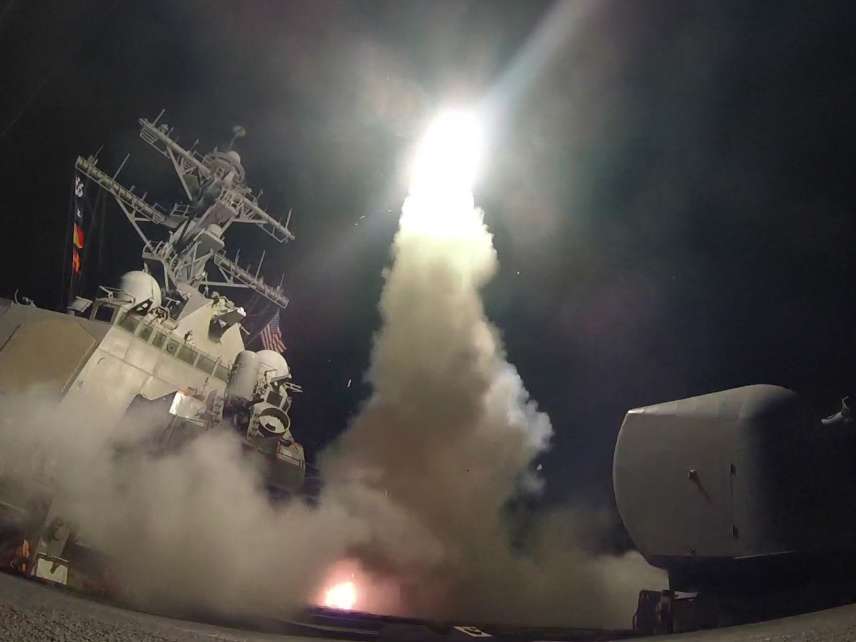Trump Mulls Military Response to Syrian Chemical Attack
Escalating U.S. intervention in Syria comes with few benefits and lots of risks.

An apparent chemical weapons attack against a rebel-held Damascus suburb has left dozens dead, prompting condemnation from Western leaders and raising the specter of a military response from the U.S. government.
At least 42 people were found suffocated in their homes in the town of Douma, while an additional 500 sought medical aid for exposure to chemical agents, according to the Syrian American Medical Society. Photos and video circulated by Syrian Civil Defense, an opposition group, likewise showed lifeless bodies with foam around their mouths.
"Many dead, including women and children, in mindless CHEMICAL attack in Syria," tweeted President Donald Trump yesterday. He pinned the blame on Syrian President Bashar al-Assad and his allies: "President Putin, Russia and Iran are responsible for backing Animal Assad. Big price…"
Israel has already responded with an airstrike against a Syrian military base. The U.S. has since given indication that it may take further action, with Defense Secretary James Mattis saying that he wouldn't rule out airstrikes. Trump promised a "major decision" on Syria within 48 hours.
In rushing to respond to this latest attack, policymakers are failing to consider either the effectiveness or the risks of military action, says John Glaser, a foreign policy expert at the Cato Institute.
"What are we actually trying to achieve? The last strike had zero strategic or tactical utility," Glaser tells Reason, referencing the missile strike Trump ordered against Assad last April for a prior use of chemical weapons. "It didn't improve the humanitarian situation. It didn't deter the Assad regime from taking action against his own people and killing his own people."
At least three uses of chemical weapons by the Syrian government have been alleged in 2018 prior to Sunday's attack. Both the Syrian government and rebel forces have used chemical weapons during the country's now eight-year-old civil war, according to the United Nations.
Only a fraction of the 400,000 people killed in the Syrian civil war have been victims of chemical weapons attacks notes Glaser, making the attention spent on their use "strange."
"Gas and chemical weapons hold a special place in our minds for revulsion and cruelty," says Glaser, "but it's not all that rational, I think, given how deadly the other forms of warfare have been in this civil war."
John Mearsheimer, an international relations scholar at the University of Chicago, has made this point as well, saying in 2014 that "the idea that getting killed by gas is more horrible than getting ripped apart by shrapnel and bullets is not one I buy."
While there is little chance that U.S. air strikes will deter Assad from targeting civilians in the future, says Glaser, there is a good chance that it will escalate the conflict, given that both Russian and Iranian forces continue to fight alongside the Syrian government.
"We're going to be competing in the air with Russia and potentially coming into a clash with them," he says. "Iranian forces are on the ground. If we kill a bunch of Iranians in these strikes, is it going to disentangle into some kind of fight against Iran in the region which would be deeply costly?"
In addition, the Trump administration lacks the legal authority to take action against Assad regime. Congress has not authorized military action against the Syrian government.
Whether any of this will be enough to deter Trump from escalating military involvement in Syria remains to be seen.
Trump expressed a desire for the U.S. to pull out of Syria—where we currently have some 2,000 troops tasked with fighting ISIS—as recently as last week. But the president has also failed to follow through on these more dovish instincts.
The advice he is going to be receiving is likely to become even more hawkish. John Bolton's first day as national security advisor is today, and CNN is reporting that he's leading an emergency meeting to formulate a Syrian response.
While Bolton has previously expressed some skepticism about U.S. intervention in Syria, he has also endorsed military action against Iran and has suggested a sustained U.S. military presence in Syria could check Iranian influence in the country.
"John Bolton has never been met with an opportunity to use U.S. military force that he didn't say yes to," says Glaser. "If he sees this as an opportunity to use military action as a demonstration that we're still number one, we're the boss, we're the global superpower—that very well might convince Trump."
Rent Free is a weekly newsletter from Christian Britschgi on urbanism and the fight for less regulation, more housing, more property rights, and more freedom in America's cities.


Show Comments (48)